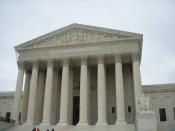It is generally accepted that the judiciary and the political powers need to be separated in the interests of justice. If political powers control both the way that laws are passed and then the way they are enforced, there is a conflict of interests, and this is generally seen as indicative if a justice system that, if not corrupt, it is open to abuse and unjust practices.
When we look at many of the justice systems in the developed world, where we argue that they are acceptable, there is a separation of the powers, this is to separate the judicial and administrational executives in order to ensure that justice is undertaken. In line with the traditional approach is to see judges and the judicial system as apolitical. However, when we consider the separation of the powers we also need to consider the way that the influence may flow not only form the government and political parties, to the judiciary, but also from the judicatory with their political actions.
If we consider the development in recent years of the judiciary, more specifically the Supreme Court in Canada we can argue that this is becoming increasingly political. However there is still a separation of the powers.
If we are to argue that the court is becoming more political by its actions we first need to consider how the separation of the powers may be seen as developing in Canada as the system under which the Supreme Court operates. After this we can then consider how it may be changing following the written Charter.
The law of Canada has its roots not in the United States, as many assume, but in Europe, with UK law. This was the law the country inherited when it was created in 1867. The English colonists brought with...


